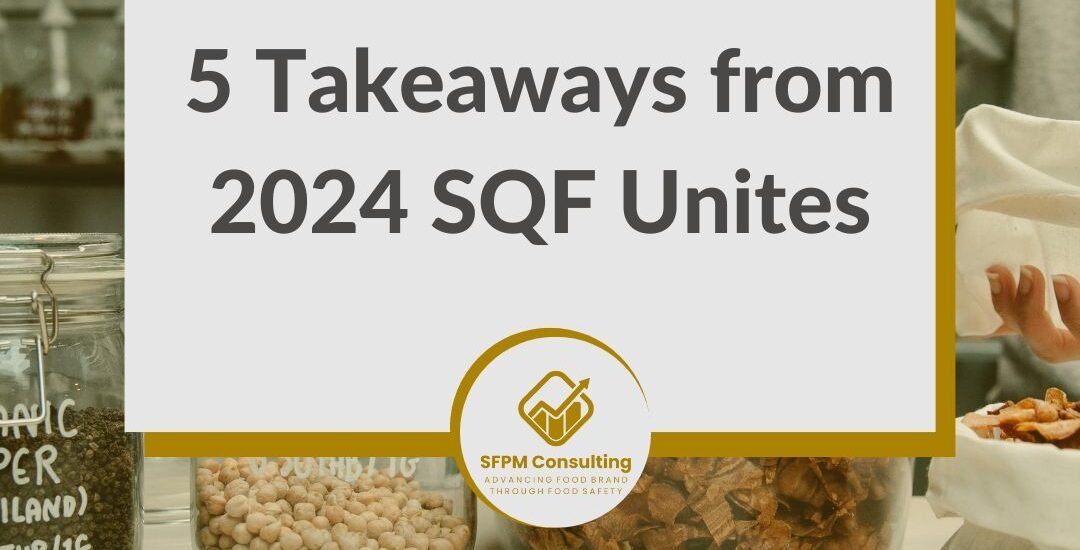5 Takeaway from 2024 SQF Unites
- March 17, 2024
- Posted by: Felicia L
- Categories: Food Safety, News, SQF

In the fast-paced world of food manufacturing, staying ahead of the curve is not just a competitive advantage—it’s a necessity. As a registered SQF Consultant, I understand the critical importance of staying informed, adaptable, and proactive in managing risks while fostering trust with consumers and retailers alike.
This year’s SQF Unites Conference was a beacon of insight, innovation, and inspiration, offering invaluable takeaways that can revolutionize the way food manufacturers approach their operations. I like to share what I have learned from SQF Unites.
AI Integration: Streamlining with Savvy
Integrating artificial intelligence (AI) into food safety processes became a pivotal theme at the conference. AI offers unparalleled potential to streamline operations, enhance efficiency, and mitigate risks—but with a caveat.
While AI can simplify tasks and uncover insights, its effectiveness ultimately hinges on human expertise and oversight. As food manufacturers, we must leverage AI as a powerful tool in our arsenal but never lose sight of the human touch.
Understanding what to look for, how to interpret data, and when to intervene is key to harnessing the full potential of AI while avoiding over-reliance.
Earlier in March, I completed a gap assessment for a client reviewing their HACCP plan built using an AI food safety plan builder, and it is not on par with the requirements. The client was not aware of how to build a food safety plan.
Can AI help? Certainly, but you’ll need to know how to.
Building Trust and Resilience: Navigating Change with Finesse
In today’s fast-paced environment, change is inevitable. Whether it’s shifts in consumer preferences, regulatory requirements, or market dynamics, food manufacturers must embrace change and adapt accordingly. At the heart of successful change management lies the cultivation of trust and resilience. By engaging stakeholders, fostering open communication, and proactively addressing concerns, food manufacturers can navigate change more effectively and minimize disruptions to operations.
Knowing what to say and how to work with your team is very important.
Moreover, implementing robust change management practices instills confidence among employees, customers, and regulatory agencies, reinforcing the organization’s commitment to safety, quality, and continuous improvement.
Certification Strategies: Safeguarding Quality and Reputation
Certifications serve as a cornerstone of risk management and trust-building in the food industry landscape, along with the strategic significance of certifications in managing risks and bolstering retailer confidence.
By investing in robust certification programs such as SQF, you can demonstrate your commitment to quality, safety, and compliance. These certifications not only enhance market access but also shield against potential liabilities, safeguarding both reputation and consumer trust.
Continuous Improvement: A Journey Toward Excellence
The pursuit of excellence is a never-ending journey—one that hinges on a commitment to continuous improvement. The conference highlighted the imperative of embedding continuous improvement principles into every facet of food safety programs.
Food manufacturers can elevate their risk management approach from reactive to proactive by embracing a culture of innovation, iteration, and optimization. From refining processes to enhancing training protocols, every incremental improvement contributes to a more resilient, agile, and effective food safety ecosystem.
Mitigating Food Fraud Risks: Vigilance in the Face of Adversity
In an industry plagued by food fraud, vigilance is paramount. The conference shed light on the insidious nature of food fraud risks and the potential repercussions of complacency. One striking takeaway was the reminder that rejected products from one source can find their way into unsuspecting supply chains if proper precautions aren’t taken.
Food manufacturers must remain vigilant, employing robust traceability measures, supplier vetting protocols, and risk mitigation strategies to safeguard against the threat of adulteration, substitution, and counterfeiting.
Are you reviewing your food fraud assessment now?
Last Takeaway: Collaborations and Collaborative Efforts
Collaborations and collaborative efforts are paramount in driving positive change and fostering innovation within the food industry.
As the keynote speaker emphasized in the SQF Unites conference’s closing remarks, establishing a collaborative relationship with SQF stakeholders is essential for success. These stakeholders encompass a broad spectrum, including food manufacturers, suppliers, retailers, regulatory agencies, industry associations, and consumers. By engaging with stakeholders and fostering open dialogue and cooperation, food manufacturers can gain valuable insights, exchange best practices, and collectively address industry challenges.
Collaborative efforts strengthen the integrity and credibility of the SQF program and contribute to advancing food safety practices and standards.
By working together towards common goals, we can create a safer, more resilient food supply chain that inspires trust and confidence among consumers worldwide.
—
These takeaways are my personal reflections from attending SQF Unites on Mar 11 to 14. If you would like to connect/collaborate further, feel free to book a networking call at https://tidycal.com/sfpmconsulting/professional-networking.
I am building a key takeaway infographic that I will share at the end of the month. Let me know if you would like to receive them.
